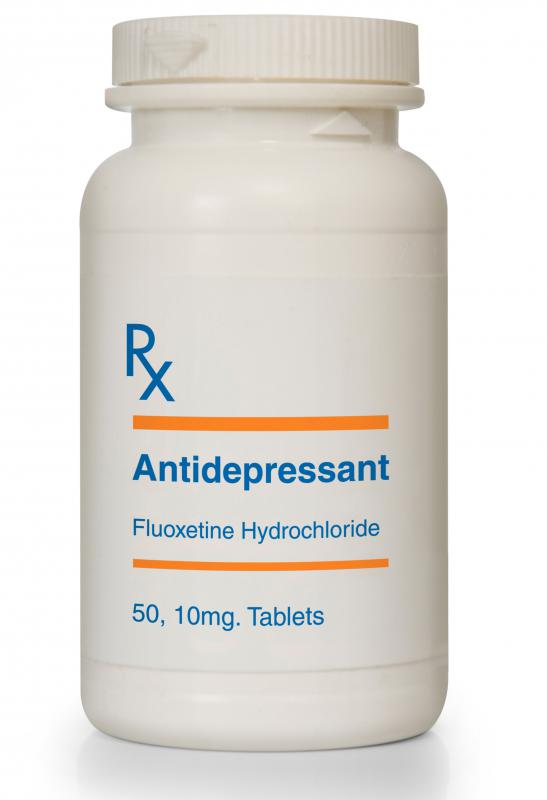At TheHealthBoard, we're committed to delivering accurate, trustworthy information. Our expert-authored content is rigorously fact-checked and sourced from credible authorities. Discover how we uphold the highest standards in providing you with reliable knowledge.
What Is a Therapeutic Class?
Therapeutic classes are a way of classifying medical drugs according to their functions. Each therapeutic class is a group of similar medications classified together because they are intended to treat the same medical conditions. These classifications are used by doctors and pharmacists when selecting appropriate treatments for patients. Commonly used classes include analgesics, which relieve pain; antibiotics, which kill bacterial infections; and anticonvulsants, which prevent seizures.
There are many different therapeutic classes. They commonly have names that describe their intended effects, such as antipsychotics, tranquilizers, and decongestants. A therapeutic class can also be named for its chemical method of action, as is the case for classes such as dopamine receptor antagonists, which inhibit the effects of the neurotransmitter dopamine by preventing it from bonding with cells, and beta-adrenergic antagonists, more popularly known as beta blockers, which diminish the effects of adrenaline and other stress-related hormones and neurotransmitters.

Medications can also be categorized in more than one drug class, according to context. For example, a drug that can be used to treat both pain and fever, such as aspirin, may be categorized as either an analgesic or an antipyretic depending on what it is being used for.
The most commonly used organized therapeutic class system is the Anatomical Therapeutic Chemical Classification System (ATC), maintained by the World Health Organization's Collaborating Centre for Drug Statistics Methodology. The ATC classifies each drug in a series of categories, starting with a group of 14 categories organizing drugs according to the system of the body that the medication is meant to affect, such as the nervous system, immune system, or respiratory system. Drugs are then classified into broad therapeutic groups according to their function, for example, analgesics or antipsychotics. The next category indicates the drug's pharmacological or therapeutic subgroup, while the last two indicate the active ingredient's chemical group and the specific chemical used, respectively.

Each category and subcategory is represented by a letter, one or more numbers, or both, giving each medication a designation containing two letters and five numbers. Medications that have multiple uses can have multiple alphanumeric codes, one for each use. An example of an ACT code is N06AB06, which designates the drug sertraline, more commonly known by its trade name Zoloft™. Sertraline is a drug used to affect the nervous system (N) that increases the nervous system's arousal (N06) and functions as an antidepressant (N06A). It has this effect on the nervous system through increasing the amount of serotonin in the extracellular fluid outside the membranes of the patient's cells by acting as a selective serotonin uptake inhibitor (N06AB) due to the active ingredient sertraline hydrochloride.
AS FEATURED ON:
AS FEATURED ON:















Discussion Comments
The only major class I didn't see in the article is antivirals. Some people don't even know that this class exists. There is a general assumption that viral infections can't be treated but that's not true. There are antiviral medications out there that fight viral infections. The one that comes to mind right away are herpes medications. These antivirals fight the herpes virus and try to keep it in a dormant state. Sometimes drugs that strengthen the immune system are used too.
@fBoyle-- I think aspirin is an anti-inflammatory. I guess everything that's a NSAID (non-steroidal anti-inflammatory drug) is one. Many of the over-the-counter pain relievers belong to this category. But then there are also steroids, they fight inflammation too. So anything that fights inflammation would belong to that class.
I've used escitalopram in the past. It's an anti-depressant. Specifically, it's a selective serotonin re-uptake inhibitor. This is the official class but it's also used off-label for anxiety. I don't think it's every labeled as such though.
Some drugs are actually used for purposes outside of their class. It's called an "off-label" use. Many drugs have more than one type of effect on the body. The major effect it's used for generally determines its class. But doctors may prescribe them for other things if they think that it will benefit the patient.
What are anti-inflammatories? Is this a therapeutic class? And does anyone know which class escitalopram belongs to? Is it an antidepressant or an anti-anxiety drug?
Post your comments